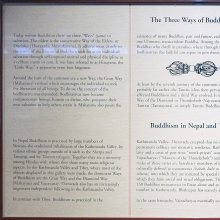Bahi, Bahī: 12 definitions
Introduction:
Bahi means something in Hinduism, Sanskrit, Buddhism, Pali, Marathi, Jainism, Prakrit, Hindi. If you want to know the exact meaning, history, etymology or English translation of this term then check out the descriptions on this page. Add your comment or reference to a book if you want to contribute to this summary article.
Images (photo gallery)
In Hinduism
Purana and Itihasa (epic history)
Source: JatLand: List of Mahabharata people and placesBahi (बहि) is a name mentioned in the Mahābhārata (cf. VIII.30.44) and represents one of the many proper names used for people and places. Note: The Mahābhārata (mentioning Bahi) is a Sanskrit epic poem consisting of 100,000 ślokas (metrical verses) and is over 2000 years old.

The Purana (पुराण, purāṇas) refers to Sanskrit literature preserving ancient India’s vast cultural history, including historical legends, religious ceremonies, various arts and sciences. The eighteen mahapuranas total over 400,000 shlokas (metrical couplets) and date to at least several centuries BCE.
Languages of India and abroad
Pali-English dictionary
Source: BuddhaSasana: Concise Pali-English Dictionarybahi : (ind.) outer; external; outside.
Source: Sutta: The Pali Text Society's Pali-English DictionaryBahi, (adv.) (cp. Vedic bahis & bahir; the s(ḥ) is restored in doubling of cons. in compn like bahig-gata Vv 5015, in bahiddhā and in lengthening of i as bahī J. V, 65) outside: 1. (adv.) J. I, 361 (°dvāre-gāma a village outside the city gates); Pv. I, 102; DhA. III, 118; PvA. 24, 61. ‹-› 2. (prep.) with Acc. (direction to) J. I, 298 (°gāmaṃ); with Loc. (place where) °dvāra-koṭṭhake outside the gate M. II, 92; A. III, 31; °nagare outside the city J. II, 2; PvA. 39. 47; °vihāre outside the monastery DhA. I, 315.—gata gone outside (i.e. into worldly affairs, or according to VvA. 213 engaged with the bahiddh’ārammaṇāni) Vv 5015 (abahiggata-mānasa with his mind not gone outside himself).—nikkhamana going outside of (Abl.), leaving Vism. 500 (mātukucchito bahinikkhamanaṃ mūlakaṃ dukkhaṃ). (Page 484)

Pali is the language of the Tipiṭaka, which is the sacred canon of Theravāda Buddhism and contains much of the Buddha’s speech. Closeley related to Sanskrit, both languages are used interchangeably between religions.
Marathi-English dictionary
Source: DDSA: The Molesworth Marathi and English Dictionarybāhī (बाही).—f (bāhu through H) The whole arm (from the shoulder-joint to the wrist). 2 The arm or sleeve of a garment. 3 A jamb or post of a door. bāhī dēṇēṃ To lend the shoulder, lit. fig. bāhī dharalyā- cī lāja dharaṇēṃ To make it a point of honor to espouse the cause of a refugee. bāhyā thāpaṭaṇēṃ -piṭaṇēṃ- māraṇēṃ To slap the arms in indication of readiness to fight. bāhyā (or bāhī) phuraphuraṇēṃ or phurāraṇēṃ -usāsa- ṇēṃ -uḍaṇēṃ g. of s. To have one's arms (or arm) quivering or itching to fight.
Source: DDSA: The Aryabhusan school dictionary, Marathi-Englishbāhī (बाही).—f A jamb (of a door).
--- OR ---
bāhī (बाही).—f bāhu m The whole arm. The sleeve of a garment.
Marathi is an Indo-European language having over 70 million native speakers people in (predominantly) Maharashtra India. Marathi, like many other Indo-Aryan languages, evolved from early forms of Prakrit, which itself is a subset of Sanskrit, one of the most ancient languages of the world.
Sanskrit dictionary
Source: DDSA: The practical Sanskrit-English dictionaryBahī (बही).—a. ([hu] or [hī] f.; compar. bhūyas; super. bhūyiṣṭha)
1) Much, plentiful, abundant, great; तस्मिन् बहु एतदपि (tasmin bahu etadapi) Ś.4. 'even this was much for him' (was too much to be expected of him); बहु प्रष्टव्यमत्र (bahu praṣṭavyamatra) Mu.3; अल्पस्य हेतोर्बहु हातुमिच्छन् (alpasya hetorbahu hātumicchan) R.2.47.
2) Many, numerous; as in बह्वक्षर, बहुप्रकार (bahvakṣara, bahuprakāra).
2) Frequented, repeated.
4) Large, great.
5) Abounding or rich in (as first member of comp.); बहुकण्टको देशः (bahukaṇṭako deśaḥ) &c. ind.
1) Much, abundantly, very much, exceedingly, greatly, in a high degree.
2) Somewhat, nearly, almost; as in बहुतृण (bahutṛṇa). (kiṃ bahuna 'why say much', 'in short'; bahu man to think or esteem highly, rate high, prize, value; tvatsaṃbhāvitamātmānaṃ bahu manyāmahe vayam Kumārasambhava 6.2; yayāteriva śarmiṣṭhā bharturbahumatā bhava Ś.4.7;7. 1; R.12.89; yeṣāṃ ca tvaṃ bahumato bhūtvā yāsyasi lāghavam Bhagavadgītā (Bombay) 2. 35; Bhaṭṭikāvya 3.53;5.84;8.12.)
See also (synonyms): bahu.
Source: Cologne Digital Sanskrit Dictionaries: Monier-Williams Sanskrit-English DictionaryBahī (बही):—[from bahis] in [compound] before r for bahis.
[Sanskrit to German]
Sanskrit, also spelled संस्कृतम् (saṃskṛtam), is an ancient language of India commonly seen as the grandmother of the Indo-European language family (even English!). Closely allied with Prakrit and Pali, Sanskrit is more exhaustive in both grammar and terms and has the most extensive collection of literature in the world, greatly surpassing its sister-languages Greek and Latin.
Hindi dictionary
Source: DDSA: A practical Hindi-English dictionary1) Bahi (बहि):—allomorph of [bahis] in certain compounds (as [bahi: śālā]:) meaning out, forth, outwards, outside.
2) Bahī (बही):—(nf) an account book; a register; ~[khātā] a ledger, an account book; a record book; —[para caḍhanā/ṭakanā] to be recorded in the account book.
...
Prakrit-English dictionary
Source: DDSA: Paia-sadda-mahannavo; a comprehensive Prakrit Hindi dictionary1) Bahi (बहि) in the Prakrit language is related to the Sanskrit word: Bahis.
2) Bāhi (बाहि) also relates to the Sanskrit word: Bahis.
2) Bāhi has the following synonyms: Bāhiṃ.
Prakrit is an ancient language closely associated with both Pali and Sanskrit. Jain literature is often composed in this language or sub-dialects, such as the Agamas and their commentaries which are written in Ardhamagadhi and Maharashtri Prakrit. The earliest extant texts can be dated to as early as the 4th century BCE although core portions might be older.
Kannada-English dictionary
Source: Alar: Kannada-English corpusBahi (ಬಹಿ):—[noun] a place or region etc. which is outside.
--- OR ---
Bāhi (ಬಾಹಿ):—[noun] a servant in a temple.
Kannada is a Dravidian language (as opposed to the Indo-European language family) mainly spoken in the southwestern region of India.
Nepali dictionary
Source: unoes: Nepali-English Dictionary1) Bahi (बहि):—adv. → बाहिर [bāhira]
2) Bahī (बही):—n. ledger; account book;
Nepali is the primary language of the Nepalese people counting almost 20 million native speakers. The country of Nepal is situated in the Himalaya mountain range to the north of India.
See also (Relevant definitions)
Starts with (+401): Bahia, Bahia powder tree, Bahibahi, Bahibala, Bahibhagya, Bahibhashin, Bahibhashya, Bahibhogya, Bahibhojin, Bahibhuja, Bahibhumika, Bahibija, Bahibolaka, Bahica Vasula, Bahicchala, Bahichchhala, Bahichhinna, Bahichinna, Bahida, Bahidakshina.
Ends with (+4): Babahi, Bahibahi, Beparbahi, Burgu abbahi, Dukhibahi, Ghodabahi, Indrabahi, Kaarybahi, Karyabahi, Khatabahi, Lilibahi, Lillibahi, Matabahi, Nagadi-bahi, Patibahi, Picabahi, Prabahi, Rokadabahi, Rujubahi, Sambahi.
Full-text (+314): Bahis, Bahihsamstha, Bahihshita, Bahirgeham, Bahirlamba, Bahirvartin, Bahiryatra, Bahihsamdhyatva, Bahihsadas, Bahihsadasam, Bahihshala, Bahihshauca, Bahihprayana, Bahihshri, Bahihstha, Bahihstomabhagam, Bahihsthayin, Vahis, Bahihsthita, Bahirajju.
Relevant text
Search found 54 books and stories containing Bahi, Bahī, Bāhī, Bāhi; (plurals include: Bahis, Bahīs, Bāhīs, Bāhis). You can also click to the full overview containing English textual excerpts. Below are direct links for the most relevant articles:
Garga Samhita (English) (by Danavir Goswami)
Verse 1.2.11 < [Chapter 2 - Description of the Abode of Śrī Goloka]
Verse 2.6.23 < [Chapter 6 - The Liberation of Aghāsura]
Verse 5.9.41 < [Chapter 9 - The Happiness of the Yadus]
Brihad Bhagavatamrita (commentary) (by Śrī Śrīmad Bhaktivedānta Nārāyana Gosvāmī Mahārāja)
Verse 2.4.230 < [Chapter 4 - Vaikuṇṭha (the spiritual world)]
Verse 2.4.22 < [Chapter 4 - Vaikuṇṭha (the spiritual world)]
Verse 2.4.20 < [Chapter 4 - Vaikuṇṭha (the spiritual world)]
The Practice Manual of Noble Tārā Kurukullā (by Dharmachakra Translation Committee)
Chapter 8 < [Appendix - Sanskrit Text]
Rasa Jala Nidhi, vol 3: Metals, Gems and other substances (by Bhudeb Mookerjee)
Part 9 - Svanga-shitala and Bahis-shitala < [Chapter XXXIV - Paribhasa (definitions)]
Part 11 - Nectarization of incinerated iron < [Chapter IV - Metals (4): Lauha (iron)]
Vinaya (3): The Cullavagga (by T. W. Rhys Davids)
Cullavagga, Khandaka 1, Chapter 26 < [Khandaka 1 - The Minor Disciplinary Proceedings]
Chaitanya Bhagavata (by Bhumipati Dāsa)
Verse 2.9.26 < [Chapter 9 - The Lord’s Twenty-One Hour Ecstasy and Descriptions of Śrīdhara and Other Devotees’ Characteristics]
Verse 2.7.63 < [Chapter 7 - The Meeting of Gadādhara and Puṇḍarīka]
Verse 2.4.66 < [Chapter 4 - Revelation of Nityānanda’s Glories]

